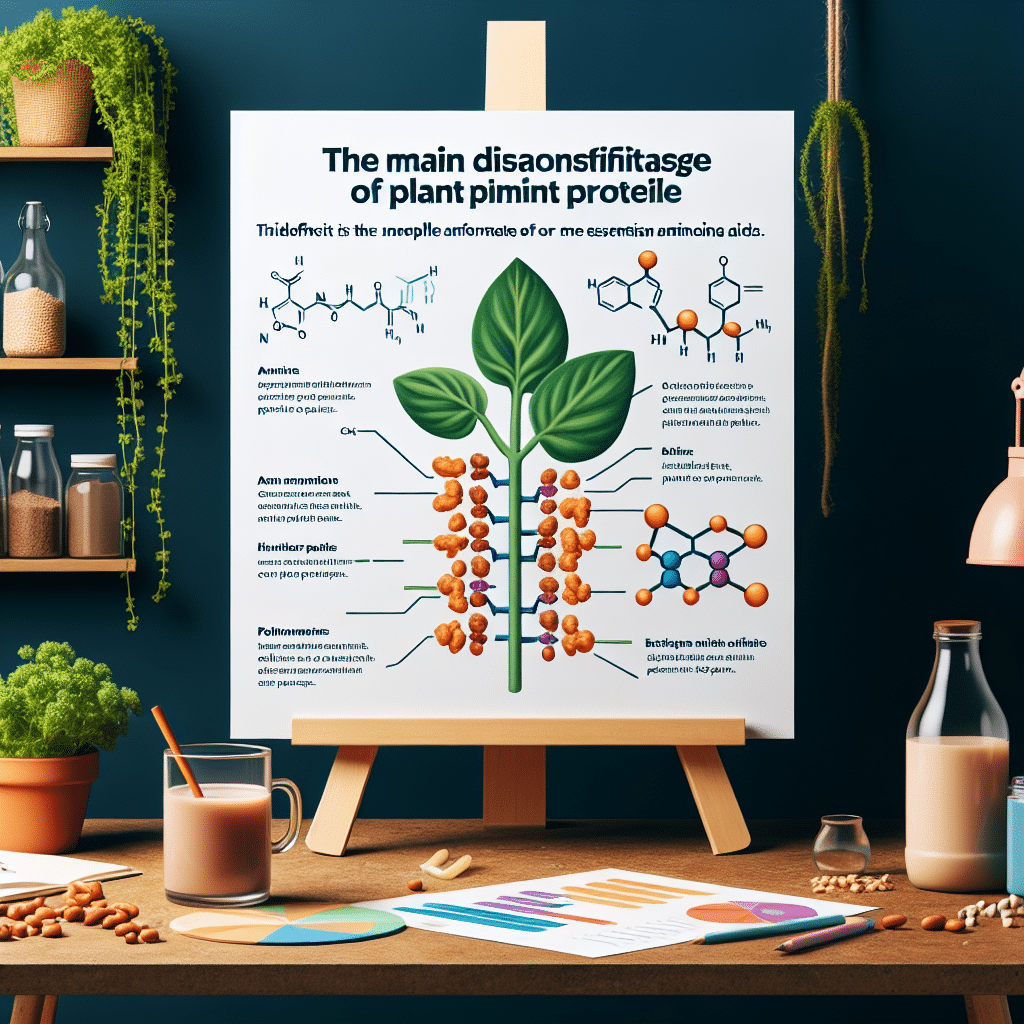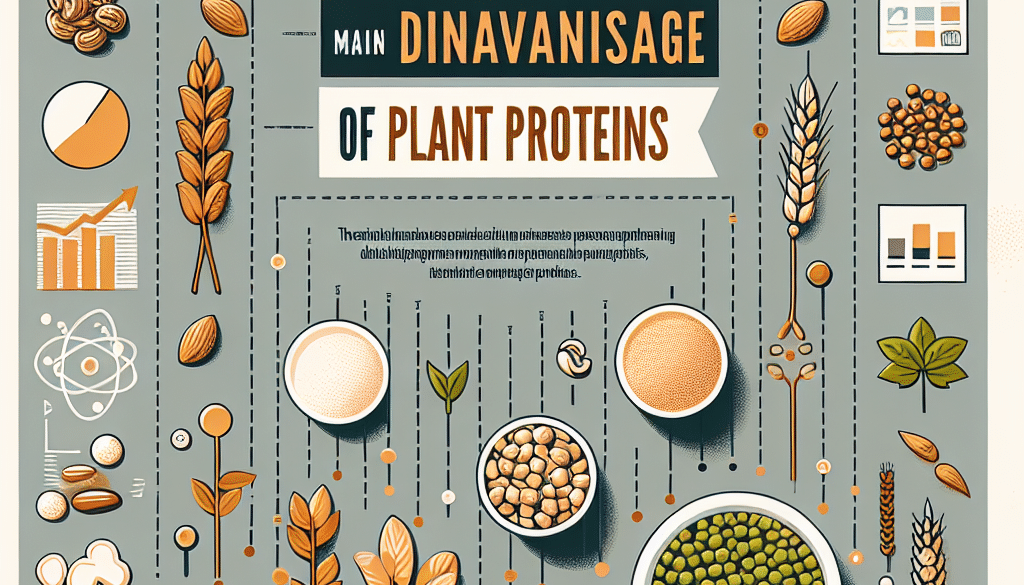What Is The Main Disadvantage Of Plant Proteins?
-
Table of Contents
- Plant Proteins: Understanding Their Main Disadvantage
- Complete vs. Incomplete Protein Sources
- Nutrient Bioavailability and Digestibility
- Protein Quantity and Quality
- Environmental and Ethical Considerations
- Combining Plant Proteins for a Complete Amino Acid Profile
- Conclusion: Balancing the Pros and Cons of Plant Proteins
- Explore ETprotein’s Premium Plant Proteins
Plant Proteins: Understanding Their Main Disadvantage

As the world becomes more health-conscious and environmentally aware, plant-based diets have surged in popularity. Plant proteins, derived from sources such as legumes, grains, and seeds, are celebrated for their sustainability and health benefits. However, despite their advantages, plant proteins have a significant drawback that often sparks debate among nutritionists, dietitians, and consumers alike. This article delves into the main disadvantage of plant proteins, providing a comprehensive analysis supported by examples, case studies, and statistics.
Complete vs. Incomplete Protein Sources
One of the primary concerns with plant proteins is their amino acid profile. Proteins are made up of amino acids, which are the building blocks essential for various bodily functions, including muscle repair, enzyme production, and hormone regulation. There are twenty different amino acids, nine of which are considered essential because the body cannot synthesize them and must obtain them from food.
- Animal proteins, such as meat, dairy, and eggs, typically contain all nine essential amino acids in sufficient quantities, making them “complete” proteins.
- Plant proteins, on the other hand, often lack one or more of these essential amino acids, classifying them as “incomplete” proteins.
This distinction is crucial for those relying solely on plant-based sources for their protein intake, as it necessitates a more strategic approach to diet planning to ensure all essential amino acids are consumed.
Nutrient Bioavailability and Digestibility
Another aspect to consider is the bioavailability and digestibility of plant proteins. Bioavailability refers to the proportion of nutrients that can be absorbed and utilized by the body. Plant proteins often contain compounds such as phytates, tannins, and fiber, which can inhibit the absorption of certain nutrients.
- Phytates, found in grains and legumes, can bind to minerals like iron, zinc, and calcium, reducing their absorption.
- Tannins, present in some legumes and beverages like tea, can interfere with protein digestibility and iron absorption.
- High fiber content, while beneficial for digestive health, can also impact the absorption of nutrients.
These factors can lead to lower bioavailability of both the protein itself and other essential nutrients when compared to animal proteins.
Protein Quantity and Quality
The quantity and quality of protein in plant-based sources can also be a disadvantage. Animal proteins are typically more protein-dense, meaning they provide more protein per serving than plant proteins. For example, a 3-ounce serving of chicken breast contains about 27 grams of protein, whereas a cup of cooked lentils, a high-protein plant food, contains about 18 grams.
Moreover, the quality of protein is measured by its digestibility-corrected amino acid score (DIAAS), which considers both the amino acid profile and digestibility. Animal proteins generally have higher DIAAS values than plant proteins, indicating a higher quality protein source.
Environmental and Ethical Considerations
Despite the nutritional challenges, plant proteins offer significant environmental and ethical advantages over animal proteins. The production of plant proteins typically requires less land, water, and energy and generates fewer greenhouse gas emissions. Additionally, plant-based diets align with ethical considerations regarding animal welfare.
- Lower environmental footprint: Plant protein production is generally more sustainable than animal protein production.
- Ethical benefits: Choosing plant proteins can be a way to avoid contributing to the industrialized animal farming system.
These factors contribute to the growing popularity of plant proteins despite their nutritional disadvantages.
Combining Plant Proteins for a Complete Amino Acid Profile
To overcome the main disadvantage of plant proteins, nutritionists often recommend combining different plant-based protein sources. This practice, known as protein complementation, ensures that all essential amino acids are present in the diet.
- Eating a variety of plant proteins throughout the day can provide a complete amino acid profile.
- Examples of complementary protein pairings include rice and beans, hummus with whole wheat bread, and peanut butter on whole grain toast.
By carefully planning meals and snacks, individuals following a plant-based diet can meet their protein and amino acid needs without relying on animal products.
Conclusion: Balancing the Pros and Cons of Plant Proteins
In conclusion, the main disadvantage of plant proteins lies in their incomplete amino acid profile and lower digestibility compared to animal proteins. However, by understanding and implementing strategies such as protein complementation and diversifying plant-based food sources, it is possible to construct a nutritionally adequate plant-based diet. The environmental and ethical benefits of plant proteins further bolster their appeal, making them a viable alternative for those looking to reduce their consumption of animal products.
For those seeking high-quality plant proteins, ETprotein company’s products offer a range of options that cater to various dietary needs and preferences. Their organic bulk vegan proteins are characterized by a neutral taste, non-GMO, and allergen-free attributes, ensuring that consumers do not have to compromise on quality or taste when choosing plant-based proteins.
Explore ETprotein’s Premium Plant Proteins
ETprotein specializes in providing a diverse array of plant proteins, including organic rice protein, pea protein, and various seed proteins. Their products are ideal for those looking to incorporate high-quality, sustainable protein sources into their diet. With a commitment to purity and excellence, ETprotein’s offerings are suitable for a range of industries, from nutraceuticals to food and beverage.
Whether you are a manufacturer, distributor, or consumer, ETprotein’s expertise in protein powder and nutritional supplements can help you meet your protein needs while supporting a sustainable and ethical lifestyle. Contact ETprotein to learn more about their products and how they can enhance your plant-based diet.
About ETprotein:
ETprotein, a reputable protein and L-(+)-Ergothioneine (EGT) Chinese factory manufacturer and supplier, is renowned for producing, stocking, exporting, and delivering the highest quality organic bulk vegan proteins and L-(+)-Ergothioneine. They include Organic rice protein, clear rice protein, pea protein, clear pea protein, watermelon seed protein, pumpkin seed protein, sunflower seed protein, mung bean protein, peanut protein, and L-(+)-Ergothioneine EGT Pharmaceutical grade, L-(+)-Ergothioneine EGT food grade, L-(+)-Ergothioneine EGT cosmetic grade, L-(+)-Ergothioneine EGT reference grade and L-(+)-Ergothioneine EGT standard. Their offerings, characterized by a neutral taste, non-GMO, allergen-free attributes, with L-(+)-Ergothioneine purity over 98%, 99%, cater to a diverse range of industries. They serve nutraceutical, pharmaceutical, cosmeceutical, veterinary, as well as food and beverage finished product distributors, traders, and manufacturers across Europe, USA, Canada, Australia, Thailand, Japan, Korea, Brazil, and Chile, among others.
ETprotein specialization includes exporting and delivering tailor-made protein powder and finished nutritional supplements. Their extensive product range covers sectors like Food and Beverage, Sports Nutrition, Weight Management, Dietary Supplements, Health and Wellness Products, and Infant Formula, ensuring comprehensive solutions to meet all your protein needs.
As a trusted company by leading global food and beverage brands and Fortune 500 companies, ETprotein reinforces China’s reputation in the global arena. For more information or to sample their products, please contact them and email sales(at)ETprotein.com today.












